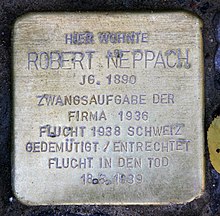Robert Neppach
Robert Neppach (born March 2, 1890 in Vienna , Austria-Hungary ; † August 18, 1939 in Zurich , Switzerland ) was an Austrian-born film architect , costume designer and film producer who was active in Germany .
life and work
Neppach had received artistic training at the Munich Academy (in drawing , design and painting ) and was hired by the director of the New Theater in Frankfurt am Main , Arthur Hellmer , as a set designer at this venue.
Neppach was seriously wounded in the Battle of Isonzo in 1917 and suffered a nervous breakdown when buried. Immediately after the end of the First World War , Neppach joined the film industry. In 1919 he started as chief architect at the small production company Centaur-Film. In a very short time he designed the backdrops for films by famous directors such as FW Murnau , Dimitri Buchowetzki , Paul Ludwig Stein , Richard Oswald , Karl Grune , Lupu Pick , Hans Steinhoff , Felix Basch , Gustaf Molander , Harry Piel , Max Ophüls and Géza von Bolváry . His most interesting and important work were the painted, stylized decorations, which helped to establish Expressionism as a film genre, for Karlheinz Martin's production From morning to midnight , for which Neppach also designed the costumes.
In the second half of 1932 Neppach switched to film production. He founded the company RN Filmproduktion GmbH, which released films by the end of 1936. After the liquidation of this private company, ordered by Propaganda Minister Joseph Goebbels , Neppach could no longer work in the German film industry. He returned to his original architectural profession before settling in Zurich on September 15, 1938.
After the First World War, Neppach married the Jewish tennis player Nelly Bamberger , who killed herself in May 1933 as a result of the increasing hostility towards Jews in Germany after the National Socialists came to power. Since autumn 1933 he was married to "Grete" Marguerite Walter, 16 years his junior, daughter of the famous conductor Bruno Walter .
The couple lived separately; At a meeting in Zurich to agree on the modalities of the divorce, Robert Neppach shot his wife and then himself. His wife had an affair with the baritone Ezio Pinza , so that in addition to the impending divorce, his jealousy can also be seen as a motive. Whether the alienation of the couple was only due to the unhappy marriage or whether it was also a consequence of state anti-Semitism in Germany cannot be conclusively clarified. The Paris daily newspaper of August 22, 1939 stated in an obituary: “This situation became unbearable in the long run, and with the longer absence Grete Walter became more and more estranged from her husband. She repeatedly suggested that he part with her. She finally initiated the divorce ... ”Thereupon Neppach tried again to win his wife back. "When he realized that this effort was in vain, he was desperate and put an end to his life and that of the woman."
Filmography
As a film architect
|
|
As a production manager, producer or artistic director
|
|
literature
- Kay Less : "In life, more is taken from you than given ...". Lexicon of filmmakers who emigrated from Germany and Austria between 1933 and 1945. A general overview. ACABUS Verlag, Hamburg 2011, ISBN 978-3-86282-049-8 , p. 364.
Web links
- Robert Neppach in the Internet Movie Database (English)
- Robert Neppach at filmportal.de
Remarks
- ↑ The often read places of birth Esslingen and Frankfurt / M. are not applicable
- ^ Necrology for Robert Neppach. Schweizer Film = Film Suisse: official organ of Switzerland, accessed on June 11, 2020 .
- ↑ This was Neppach's last film production. The often-to-read movie Twice in two four-poster bed was not Neppach but in 1937 by Peter Ostermayr produced
| personal data | |
|---|---|
| SURNAME | Neppach, Robert |
| BRIEF DESCRIPTION | Austrian-born film architect, costume designer and film producer active in Germany |
| DATE OF BIRTH | March 2, 1890 |
| PLACE OF BIRTH | Vienna , Austria-Hungary |
| DATE OF DEATH | August 18, 1939 |
| Place of death | Zurich , Switzerland |
